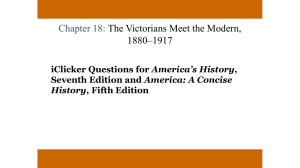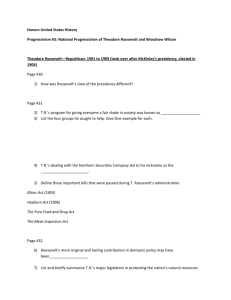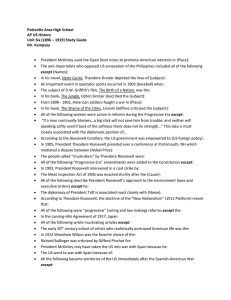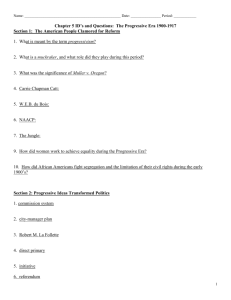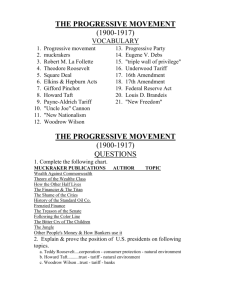Chapter 5
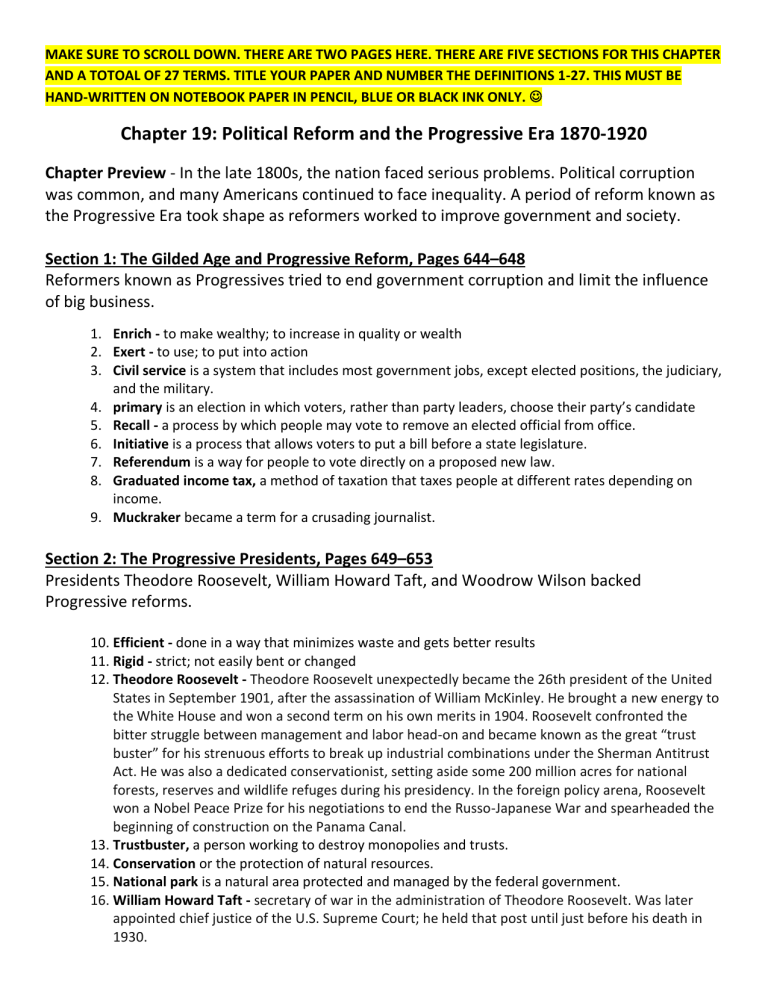
MAKE SURE TO SCROLL DOWN. THERE ARE TWO PAGES HERE. THERE ARE FIVE SECTIONS FOR THIS CHAPTER
AND A TOTOAL OF 27 TERMS. TITLE YOUR PAPER AND NUMBER THE DEFINITIONS 1-27. THIS MUST BE
HAND-WRITTEN ON NOTEBOOK PAPER IN PENCIL, BLUE OR BLACK INK ONLY.
Chapter 19: Political Reform and the Progressive Era 1870-1920
Chapter Preview - In the late 1800s, the nation faced serious problems. Political corruption was common, and many Americans continued to face inequality. A period of reform known as the Progressive Era took shape as reformers worked to improve government and society.
Section 1: The Gilded Age and Progressive Reform, Pages 644–648
Reformers known as Progressives tried to end government corruption and limit the influence of big business.
1.
Enrich - to make wealthy; to increase in quality or wealth
2.
Exert - to use; to put into action
3.
Civil service is a system that includes most government jobs, except elected positions, the judiciary, and the military.
4.
primary is an election in which voters, rather than party leaders, choose their party’s candidate
5.
Recall - a process by which people may vote to remove an elected official from office.
6.
Initiative is a process that allows voters to put a bill before a state legislature.
7.
Referendum is a way for people to vote directly on a proposed new law.
8.
Graduated income tax, a method of taxation that taxes people at different rates depending on income.
9.
Muckraker became a term for a crusading journalist.
Section 2: The Progressive Presidents, Pages 649–653
Presidents Theodore Roosevelt, William Howard Taft, and Woodrow Wilson backed
Progressive reforms.
10.
Efficient - done in a way that minimizes waste and gets better results
11.
Rigid - strict; not easily bent or changed
12.
Theodore Roosevelt - Theodore Roosevelt unexpectedly became the 26th president of the United
States in September 1901, after the assassination of William McKinley. He brought a new energy to the White House and won a second term on his own merits in 1904. Roosevelt confronted the bitter struggle between management and labor head-on and became known as the great “trust buster” for his strenuous efforts to break up industrial combinations under the Sherman Antitrust
Act. He was also a dedicated conservationist, setting aside some 200 million acres for national forests, reserves and wildlife refuges during his presidency. In the foreign policy arena, Roosevelt won a Nobel Peace Prize for his negotiations to end the Russo-Japanese War and spearheaded the beginning of construction on the Panama Canal.
13.
Trustbuster, a person working to destroy monopolies and trusts.
14.
Conservation or the protection of natural resources.
15.
National park is a natural area protected and managed by the federal government.
16.
William Howard Taft - secretary of war in the administration of Theodore Roosevelt. Was later appointed chief justice of the U.S. Supreme Court; he held that post until just before his death in
1930.
17.
Woodrow Wilson – 28 th president of the United States and led the country through WWl and founded the League of Nations.
Section 3: The Rights of Women, Pages 656–659
After decades of effort, women finally won the right to vote.
18.
Devise - to carefully think out; to invent
19.
Commit - to make a pledge or promise
20.
Carrie Chapman Catt - devised a detailed strategy to win suffrage, state by state, across the nation.
21.
Suffragists - people who worked for women’s right to vote,
22.
Alice Paul – suffragist who took more forceful steps. Paul met with President Woodrow Wilson in
1913. Paul told Wilson that suffragists had committed themselves to achieving such an amendment. Wilson pledged his support.
23.
Frances Willard became president of the Woman’s Christian Temperance Union (WCTU) in 1879.
Willard spoke tirelessly about the evils of alcohol. She called for state laws to ban the sale of liquor.
She also worked to close saloons. In time, Willard joined the suffrage movement, bringing many
WCTU members along with her.
24.
prohibition, a ban on the sale and consumption of alcohol
Section 4: Struggles for Justice, Pages 660–665
African Americans, Mexican Americans, Asian Americans and religious minorities all faced challenges.
25.
Submit - to yield; to give up power or control
26.
Crisis - turning point; situation involving great risk
27.
Booker T. Washington emerged as a most prominent African American. Born into slavery,
Washington taught himself to read. He worked in coal mines, attending school whenever he could.
In 1881, Washington helped found the Tuskegee Institute in Alabama. The school offered training in industrial and agricultural skills. Washington advised African Americans to learn trades and seek, to move up gradually in society. Eventually, they would have money and the power to demand equality.
28.
W.E.B. Du Bois A brilliant scholar, Du Bois was the first African American to receive a Ph.D. from
Harvard University. He agreed with Booker T. Washington on the need for “thrift, patience and industrial training.” However, Du Bois criticized Washington for being willing to accept segregation.
29.
lynching, or murder by a mob
30.
Parochial schools, or schools sponsored by a church.
31.
anti-Semitism, or prejudice against Jews
